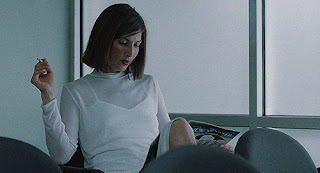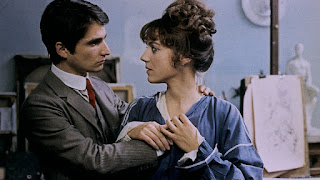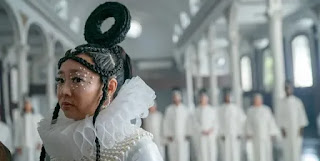I'm lucky I got into games so late because I just get to play the greats one after the other. If Dark Souls isn't the greatest (and plenty of people think it is), then it really is up there. I've just beaten it and have also watched and listened to a bunch of people who really love the game talk about what makes it so special (The Bonfireside Chat podcast has been a great companion during my playthrough, and this recent YouTube essay on the trilogy by Noah Caldwell-Gervais is also very insightful). All of that discourse has clarified for me what makes the game work so well, but also why it doesn't quite find its place in my personal pantheon of RPGs.

A lot of that is down to my preferences when it comes to story and character, which I've found is usually more important to me than mechanics and gameplay. What is Dark Souls about, anyway? In a lot of ways it's about the experience of playing Dark Souls. The plot of the first two thirds of the game is explicitly about testing you on whether you are good enough to progress to the final third. The powers-that-be are on the lookout for a chosen one, and set up challenges to see if the player passes – escape from a prison, ring two bells on opposite ends of the world map guarded by (many) bosses, navigate a trap-filled castle and finally break into the capital city and defeat the last remaining champions of the gods. The world is searching for an individual with the discipline and determination to get through its toughest challenges. Achieving that makes you a powerful enough sacrifice to keep the world going. Ludonarrative consonance is a revered property in games, and Dark Souls takes it to the nth degree. It even hangs a lantern on its demanding nature. Giving up on the task is to "go hollow" – a metaphor for losing purpose and giving up on the game. Dark Souls is littered with these hollows, emphasising that most players won't get to the end. It also makes your achievement if you do feel that much more special.
There is actually a choice at the end of the game. You can do as you are told and sacrifice yourself to keep the age of fire going, or you can keep your power and walk away ushering in the age of dark. The consequences of these two choices on the world are ambiguous, and future games will reveal that the two ages recur endlessly anyway, making the decision less significant. It’s more meaningful from a role-playing perspective. Is your character a chivalrous sort who will sacrifice themselves on behalf of others, even if the world they save is imperfect and its masters are liars? Or do you prefer to kill all the gods and have the remaining powers-that-be (and the game) explicitly acknowledge your greatness, even if that makes you a lord of nothing? Kindling the flame is selfless but foolish. Walking away is selfish and sinister. It's not a clear-cut good or bad decision, but it holds weight in terms of how you wish to view your character. Its broader meaninglessness may be another ludonarratively consonant comment on the game itself. Well done, but was it really worth the effort? The New Game Plus starts immediately after anyway – your story also recurs endlessly. All players eventually have to get of the treadmill. We all go hollow in the end.

The approach to storytelling in the game is inspired by the Japanese lead designer's teenage love of Anglophone pen-and-paper RPG game books and monster manuals. Reading in a different language meant he could only partially understand the descriptions. He was piecing together fragments, often relying on visual clues. Dark Souls replicates this experience. NPC dialogue is short, ambiguous and cannot be trusted. You can learn a bit more by reading item descriptions (your character has no history or memory but does have a psychic ability to glean knowledge from their possessions, i.e. their D&D lore ability is at 100). Any connections you make are always provisional, and most are tenuous. The pieces don't always fit. Moreover, when it comes to choosing between having more consistent lore and making the gameplay work, the developers usually go for the latter. For example, the fact that bosses and minibosses don't respawn, but hollows do, doesn't make a huge amount of sense. Surely more powerful creatures would be able to withstand death better than minions. But that would make the game too difficult and irritating to play, so very wisely the developers don't do it.
For me, the evocative suggestion of something is not as powerful as a deeper exploration of something. Dark Souls does a lot with minimal dialogue and item descriptions, but ultimately I find RPGs with a surfeit of dialogue and writing more narratively and emotionally engaging. Solaire and Siegmeyer are probably the most fully-developed characters you meet in the game. They are well-written and well-voiced, but you can sum them up in a sentence. Their stories are tragic, and much of that tragedy is effectively conveyed visually at the final point you meet them. That might be powerful enough for some players, but it wasn't for me. In Solaire's case there is a bit more digging you can do to connect him to other characters in the game, but making that link is intellectually rather than dramatically or psychologically satisfying.

Bosses and areas also have backstories that relate to each other. That's commendable, but it also doesn't add up to very much for me. The daughters of chaos may be the best (and saddest) example. These fire witches made a decision with good intentions that had horrible and profound unintended consequences. That’s mostly it. The epic nature of their mistake has a pathos to it, particularly as it’s communicated by a whole environment, but it’s still quite depersonalised. The situation is so far removed from your experience that it's difficult to engage with it. It's interesting background while you go around dealing with the demons they have unleashed.
The emotional satisfaction of the game is in the play of it. It's a wild rollercoaster compared to the subtle character moments you glean if you look hard enough. The sense of relief at finding a new bonfire, the checkpoint from which you can comfortably bank your winnings and start taking risks again, feels like a sigh made with your whole body. The adrenaline rush of whittling away a tough boss’s health while trying not to make mistakes, and the sense of achievement at getting it right, is just as physical. Your heart beats faster at the sight of these monsters you have to fight. The game does everything to heighten that experience – bosses are always bigger than you, sometimes ten times bigger, which adds to their intimidating nature. Famously, Dark Souls audio is mostly diegetic. Non-diegetic music is mostly saved for bosses and that contrast significantly ups the tension. The challenge-reward loop is the basic building block of a game – Dark Souls focuses on that and refines it.

You cannot play Dark Souls in a lazy way. Weak enemies will murder you if you don’t put the effort in. Eventually I levelled and min-maxed to the point where that wasn’t true, but for most of the game I couldn’t just let my guard down and underestimate an encounter, even one I had done many times before. If you let three hollows in the Burg gang up on you, you could be in some serious trouble. The game is less taxing on your reflexes than later entries. Enemies move slowly, and you do too. The trick is to read an encounter, learn the move set, execute a plan, and iterate when it doesn’t work, rather than constantly reacting quickly to new information. Getting impatient is usually a recipe for disaster, and players often talk about the wisdom of taking a break when you get stuck or hit a wall.
Dark Souls is notorious for being difficult. Actually, the game is more welcoming that the discourse (and perhaps the community) around it might make it appear. There is no difficulty slider or story mode in the options menu, but you can make the game more or less difficult by the decisions you make in the game. The most obvious way the game helps you out is giving you the opportunity to summon help for certain bosses. There are costs associated with it – it's tied to a resource that feels rarer than it is, and it also gives the boss extra health. Even so, in most cases it makes the boss easier to beat by dividing its aggro, giving you more opportunities to safely deal damage while it's distracted.
Dark Souls is an action game where mastering your move-set and the move-set of enemies is important to your success. Reacting to an enemy's actions – attacking, blocking, healing and dodging at the right time – is part of the play. Brilliant players who have mastered this dance can rush in and duel enemies ‘fairly’, but there isn’t a mechanical reward for it. The only reward is the player’s own sense of achievement. The idea that the 'real' way to play the game is to dedicate the time to mastering your movements to the point where you can beautifully take down everything and avoid getting hit is a fiction. Most players won’t (and some players can’t) do that. The developers knew this and made sure there were a range of options available to tackle the challenges they set for the player.

Reactivity or reflex is in any case something that becomes more significant in the successors of Dark Souls than Dark Souls itself. The sense of direction is evident from the DLC, where bosses start to move faster. For the most part though, Dark Souls is quite generous with telegraphing an enemy's intentions. They move slowly, and their wind-ups are often quite easy to read. The job is to learn how they move, bait their attack, block or avoid it, and counter-attack while they are in their recovery animation and therefore vulnerable. You also move slowly and may have your own wind-ups and recovery animations, but generally the pace of combat is generous enough to accomodate players who lack twitchy reflexes, as I do. You have more time to decide what to do than you might think.
Some expert players challenge themselves by trying to get through the game without levelling at all – a "soul-level one run". That just goes to show that Dark Souls is still an RPG and levels do eventually count. The game is very explicit about this – the branches from the opening area can lead to places with tough enemies that you will struggle with when you start out. It's a signal that you should come back when you are stronger. It's a lesson that applies throughout the game – if you're in a tough spot, you might need a boost by grinding up a few levels and upgrades. Every level not only allows you to increase a stat, but slightly improves your defence. I survived Manus, the final boss of the game, mostly because I had over-levelled and upgraded to the point where I could soak the collossal amount of damage he was dealing out, and could button-mash my way to victory. It wasn't very elegant, but it worked.

One thing that is very elegant is the economy in the game. Souls are experience points but also currency – you use the same resources to improve your base stats and your gear. The latter might be even more important than the former. Upgrades are gated by finding one-of-a-kind embers, as well as a resource called titanite which you can buy from merchants or find as treasure or drops from enemies. These items are indications of where in the upgrade path you need to be in order to find a level manageable. This added bit of complexity might be confusing or annoying, but it also means that any weapon you find can be viable if you upgrade it. Move-set is more important than stats, and if you find something you like you can stick with it to the end of the game. The variety of weapons and builds that you can try out also means the game is very replayable.
The game gives several opportunities to grind up levels and upgrades. A famous exploit to do so in Darkroot Garden could have been patched out, but it wasn't and you could see that as a concession to players having a hard time. Although move-set is important, this is still an RPG, there is a power curve and you can work to stay ahead of it. Even if you don't want to grind your way out of problems, a big part of playing the game is working out the tools and strategies that can mitigate a difficult encounter. I’m a coward with bad reflexes, so mastering the move-set wasn't going to get me over the line. Cheese did instead. The simple trick of using a bow to pick off enemies one by one, and bait them into environments where I was more comfortable fighting them, is viable throughout. There aren't many ambushes in Dark Souls. Enemies don't patrol – you can look at them as much as you want before you decide how to attack. The bow meant I could break up what looked like impossible encounters into manageable bits. There's no penalty for this – whatever works. In my head cannon I was wily rather than brave. I used the environment against my enemies. My bag of tricks, including very powerful limited-use fire spells, meant I could beat bosses who are far more powerful than me.
Dark Souls is not always clear about where to go or what to do next. There are many secrets. Some very important resources and checkpoints are hidden away. This is mitigated by the online elements of the game, where players can leave each other messages pointing you in the right direction (or the wrong one). The game also has a more explicit multiplayer aspect, where you can duel other players or call on their help to defeat bosses. Unfortunately, the discovery of a dangerous exploit meant that the Dark Souls servers on PC were down during my playthrough (the developer is apparently working on a fix). That meant I avoided getting randomly murdered by more able players, but it also meant I didn't participate in the sense of community that this game could generate. That shared experience might be a part of why some players have such an affection for this game, although as someone not particularly interested in multiplayer generally I didn't see it as a great loss.
Although I had to lean on external guides and commentary to find my way around, it's undeniable that Dark Souls is a masterclass in level design. As Duckfeed's Gary and Kole like to say – knowledge reduces distance. Progress in Dark Souls is governed by bonfires, and the game withholds your ability to teleport between them until the final third. Instead it wants you to fight your way through to each new bonfire. Unfamiliar new areas feel huge and daunting – but you will eventually be able to run through them without a care in the world. It's most impressive trick is to use verticality to create shortcuts between seemily distant parts of the world map. The opening up of such shortcuts, allowing you to bypass entire areas with enemies you've struggled against for so much time, provides a huge sense of achievement and relief. And seeing how the world connects together provides its own sense of satisfaction.

So much of the significance of Dark Souls is wrapped up in the experience of playing it. It is about the emotional journey of finding safety after danger, overcoming an enemy or situation that seemed impossible, and the determination to keep going despite the hostile and desolate world you find yourself in. These ups and downs are what games are about, and for all its evocative but ambiguous lore, Dark Souls is a very gamey game. It's perfectly legitimate to ignore the story entirely and just enjoy the ride – the finely balanced combat and the expertly designed encounters and levels. Dark Souls is a very honed product – story and character stuck tightly to mechanics rather than spinning outwards to create new significances. My favourite RPGs (New Vegas, Torment, Bloodlines) are more diffuse, where NPCs and side-quests peel off more easily from the gameplay. They also tend to have a much higher word count, and that might be the underlying factor in my appreciation for them. For me, writing in games matters an inordinate amount, and Dark Souls cannot compete with these other overwritten western RPGs. It's a fantastic game, but not among my very favourites.
 The Infernal Desire Machines of Doctor Hoffman by Angela Carter
The Infernal Desire Machines of Doctor Hoffman by Angela Carter



















